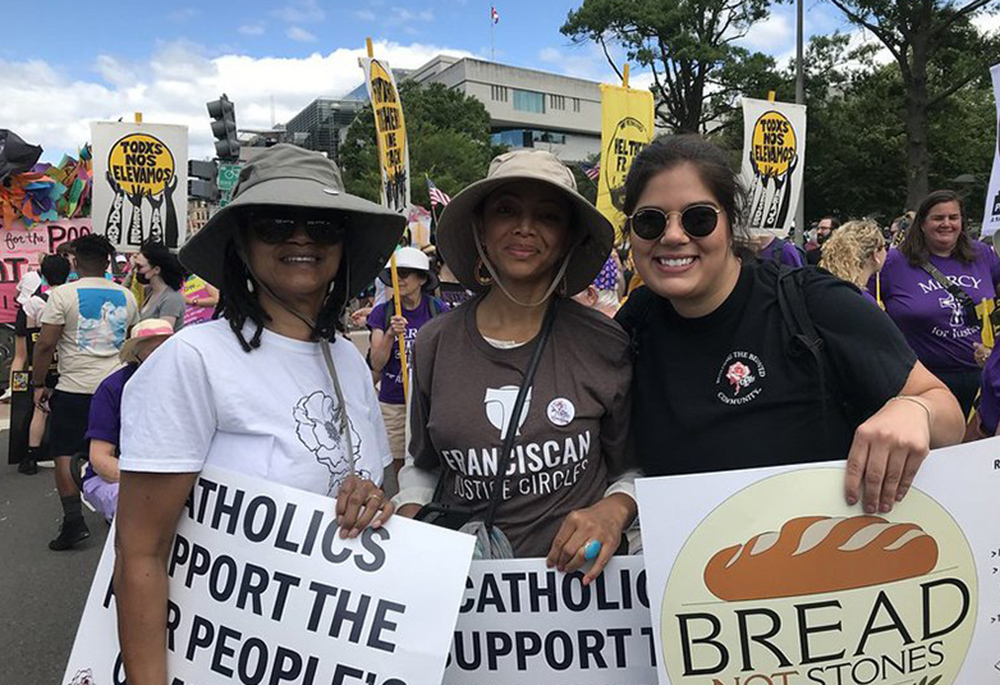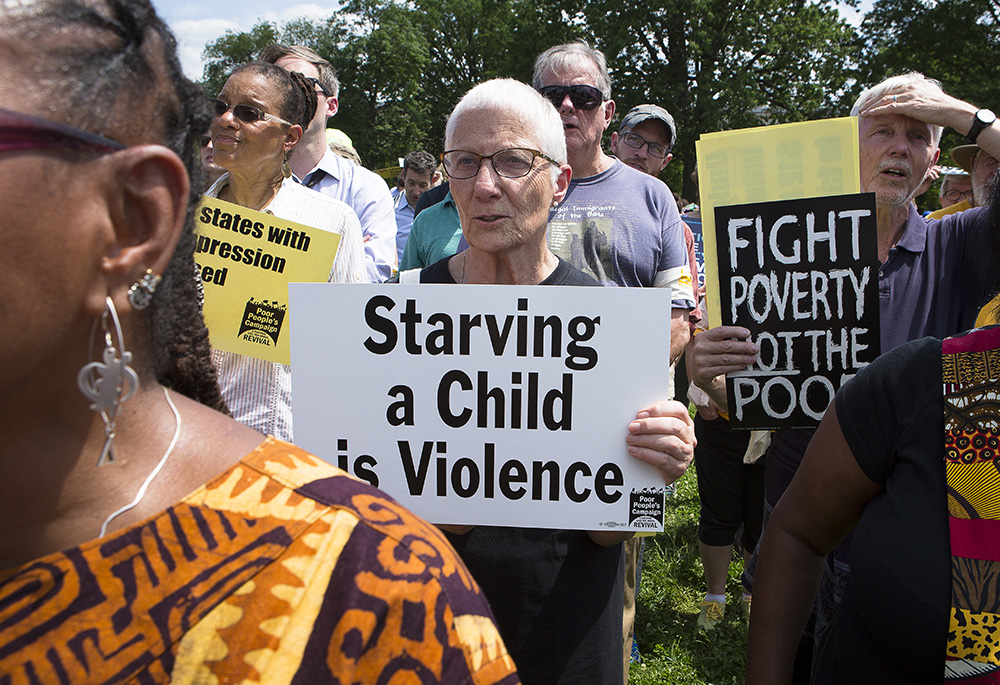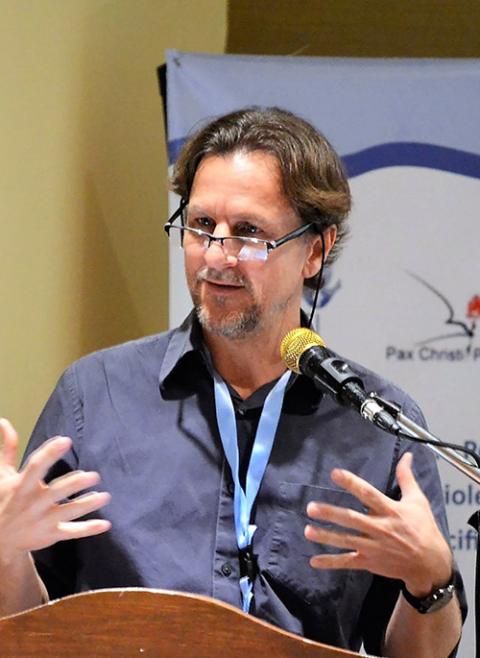
Charlene Howard, chairwoman of the Pax Christi USA national council, Josie Garnem, a national council member, and Lauren Bailey, the organization's national field organizer, pose during a demonstration June 18 in Washington, calling for prioritizing federal budget expenditures for human needs rather the military. (CNS/Courtesy of Pax Christi USA)
Pax Christi USA, a branch of the international Catholic peace movement, will celebrate its 50th anniversary with a conference Aug. 5-7 just outside Washington.
Johnny Zokovitch, the group's executive director, told NCR the 50th anniversary is an opportunity both to celebrate the vision of the founders, who understood "how much the church needed an organized peace witness," and to focus on "looking forward and building on that legacy" by engaging young people in the movement.
Pax Christi USA has been preparing for this conference for the last three years, led by 50th anniversary coordinator Michelle Sherman.
"We're busy," said Charlene Howard, the group's National Council chair, speaking about the involvement of every member of their board in supporting the conference.
The conference will feature a keynote address by Santa Fe Archbishop John Wester, who released a pastoral letter calling for nuclear disarmament at the beginning of 2022. As Catholic News Service reported, two of three U.S. nuclear weapons research facilities, the Sandia and Los Alamos national laboratories, as well as the nation's largest nuclear weapon storage facility, are located in Wester's archdiocese.
Marie Dennis, who was co-president from 2007-19 of Pax Christi International, an umbrella group of Pax Christi groups across the world, said that Wester's call for nuclear disarmament, especially because of the location of his archdiocese, is a model for how Catholics might pursue difficult conversations about ethical questions.

Marie Dennis is seen near Capitol Hill May 21, 2018, in Washington. (CNS/Tyler Orsburn)
"How do we imagine another economy where people do have jobs, where people are not dependent on building weapons?" asked Dennis, who is currently serving as the program chair of the Catholic Nonviolence Initiative, which focuses on issues of nonviolence and just peace.
"We have got to find ways to extricate our economy from a dependence on war and the war machine," said Dennis.
Retired Detroit Auxiliary Bishop Thomas Gumbleton, a founding member of Pax Christi USA, said he hopes Wester will draw on the U.S. bishops' 1983 pastoral letter, "The Challenge of Peace: God's Promise and Our Response" in his talk at the conference. In that letter, the bishops said the arms race "poses a threat to human life and human civilization which is without precedent."
Gumbleton, who was simultaneously part of the bishops' committee who wrote the 1983 document and then-president of Pax Christi USA, said he relied on advice from members of the movement while working on the letter. "I hope that [Wester] can reinforce everything that we said back in 1983 and make it a message that people will be attracted to and follow," Gumbleton said.
Advertisement
Pax Christi's dedication to nuclear disarmament has deep roots.
Said Dennis: "Pax Christi was founded in the middle of the Cold War and began with a recognition that the United States was a central, very important player in what would happen during the Cold War and where we would go in terms of war or peace in the future, so the responsibility of Pax Christi USA began with, I think, a very deep and serious commitment to pulling the United States back from the brink of war."
Gumbleton said that the organization had a difficult start until Erie, Pennsylvania Benedictine Sr. Mary Lou Kownacki became executive director. He said the Benedictines built Pax Christi USA into "a strong movement." "Without that change, we would have just sputtered out, I think," he said.
Members of Pax Christi USA have been part of hundreds of demonstrations in the 50 years since the organization's founding. In January 1991 the organization brought together Catholic and other religious leaders in Washington to call for an end to the Gulf War. (CNS/Courtesy of Pax Christi USA)
The organization faced another inflection point when other peace organizations faded away at the end of the Cold War. But Pax Christi USA remained, which Zokovitch credits to the "multi-issue and intersectional" focus of the movement. Pax Christi endured because, instead of a "war/peace axis," the movement was built around "an oppression/liberation axis," he said.
Howard emphasized this perspective, saying, "What does peace really mean? It's not the absence of war. It is living in an environment in the way that God intends for it so that everyone can thrive."
'What does peace really mean? It's not the absence of war. It is living in an environment in the way that God intends for it so that everyone can thrive.'
—Charlene Howard, National Council chair for Pax Christi USA

Johnny Zokovitch, executive director of Pax Christi USA, is seen in this undated photo. He said the organization has been rooted in Catholic social teaching for 50 years and has placed a greater emphasis on how economic justice, racial equality and military spending are interconnected. (CNS/Courtesy of Pax Christi USA)
This understanding of peace led Pax Christi to make a commitment to internal anti-racist work in the mid 1990s. "If we were going to be authentic about calling ourselves the national Catholic peace and justice movement," Zokovitch said, "we needed to better reflect the experience and the contributions of the U.S. Catholic church," which was much more racially diverse than the movement at that time.
This anti-racist work continues with the Pax Christi Anti-Racism Team and throughout the organization. "Anybody who does anti-racism work will tell you it's not a comfortable place at all. It's a place of great tension and discomfort," said Zokovitch, who has led Pax Christi USA since 2019 and previously worked for both the U.S. and international organizations.
Howard is dedicated to "the continual increase of the visibility and viability of the organization among people of color," especially among other African Americans like her. "I want us, as an organization, to be intentional about not only addressing issues of anti-racism, but also being very intentional about, 'Well, what does that look like?' "
After the 50th anniversary conference, Zokovitch said Pax Christi will turn its attention to engaging high school and college students and young adults in the movement.
And while the group is impacted by the exodus of young people from the Catholic Church, Zokovitch is hopeful that the movement's elevation of women to leadership roles, openness to LGBTQ people, and embrace of "the deepest longings that people have for a transformed society that is rooted in the values of peace and justice and love and compassion" will differentiate Pax Christi from the institutional church.
"If you are having trouble finding a place for how it is that you envision your faith within the Catholic context, in your parish or within your school or within your diocese," Zokovitch said, "Pax Christi USA actually is a home for you."







